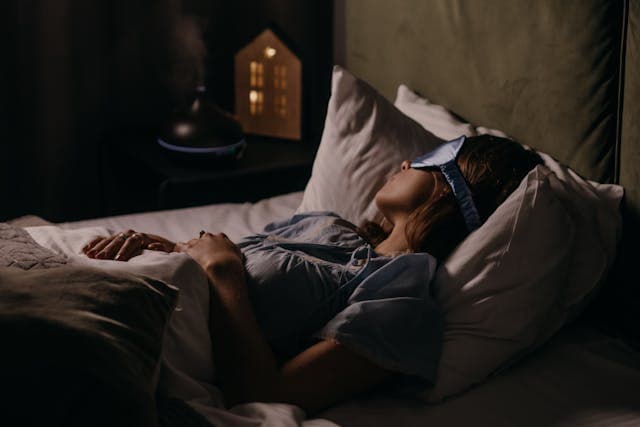Sleep issues. It seems like everyone has them these days. When you’re a parent and you need your energy to take care of your children, insomnia can really mess with your life. I have the opposite issue, in that I am tired all the time and want to sleep as much as possible, but I hate going to sleep. Sometimes, though, when I finally decide to shut off my phone and go to sleep, my brain won’t shut off.
Here are some things to do when you’re dealing with insomnia.

Many parents face insomnia, especially when they’re the only ones awake. The demands of parenting make sleep difficult. Handling insomnia as the only parent awake can be overwhelming. The constant responsibility adds stress, leaving little time to rest.
Sleepless nights create fatigue, making daily tasks more challenging. Exhaustion can quickly set in with no one else to share the load. This lack of sleep can impact both your physical and emotional health. Searching for solutions becomes essential when you’re constantly awake. The burden of being the sole parent awake makes it even harder to get proper rest.
Learn how to handle insomnia effectively and regain control over your nights with these practical tips to improve your sleep habits.
Understand the Root Causes of Insomnia
Understanding the root causes of insomnia is important, especially for parents. Stress and anxiety are major contributors to sleepless nights. Constant worry about children, work, and home responsibilities can keep parents awake at night. Parents often feel they are constantly on duty, leaving them mentally and physically exhausted.
Handling insomnia becomes even harder when the pressure never seems to end. Sleep deprivation worsens emotional well-being, affecting mood and overall mental health. Lack of rest can lead to irritability, anxiety, and even depression. Identifying these causes can help develop better solutions for better sleep.
Common causes of insomnia in parents:
- Stress from juggling multiple roles (parent, worker, partner).
- Anxiety over children’s well-being and future.
- Constant physical and mental exhaustion.
Establish a Nighttime Routine
Establishing a calming nighttime routine can significantly improve sleep quality, especially for parents struggling to figure out how to handle insomnia. A consistent routine helps signal to the body that it’s time to unwind and prepare for rest.
Activities like reading, practicing meditation, or doing light stretching are all effective ways to calm the mind and relax the body. These actions can reduce stress and ease the tension that builds up throughout the day. Sticking to a regular sleep schedule, even on weekends, strengthens the body’s natural sleep-wake cycle.
By going to bed and waking up at the same time each day, the body learns when to sleep, leading to better rest. A steady routine encourages sleep and improves sleep quality, making it easier to feel refreshed and restored by morning.

Resisting the Temptation to Rely on Sleep Aids During Stressful Times
Parenting through sleepless nights is more than exhausting, especially for solo parents. It’s a relentless balancing act of meeting everyone’s needs while silently sacrificing your own. Without a partner to share the load, the pressure to stay strong can feel crushing, especially when rest is nowhere in sight.
In these moments of deep fatigue and emotional strain, the temptation to turn to sleep aids can be overwhelming. A pill may promise quick relief, a brief escape from the weight of exhaustion—but it’s not without cost. While medication can offer short-term comfort, it’s important to recognize the risks of sleep medication misuse, especially when used as a long-term solution rather than an occasional aid.
Over time, relying on pills to sleep can lead to dependency and make it harder to rest without them. Instead of addressing the root causes—like anxiety, overstimulation, or inconsistent routines—medication can merely mask the symptoms. Healthy sleep habits, though slower to take hold, offer more sustainable relief.
Incorporating calming bedtime rituals, adjusting screen time, and seeking support when needed can gently guide the body back into balance. For those struggling night after night, talking with a healthcare provider can help uncover safer, more lasting strategies—without falling into the trap of overuse or dependency.
Create a Sleep-Friendly Environment
One of the best ways to improve rest is by optimizing your bedroom for sleep. Creating a sleep-friendly environment is the first step. Keeping your room cool, between 60-67°F, helps your body relax and prepare for sleep.
Darkening the room with blackout curtains or using an eye mask helps promote melatonin production, signaling your body that it’s time to rest. Reducing noise with earplugs or a white noise machine can enhance your sleep environment. A comfortable mattress and pillow are also important for quality rest.
Choose a mattress that properly supports your body, and ensure your pillow matches your sleeping position. Besides, eliminating distractions like screens can prevent your mind from staying active, making it easier to fall asleep.

How to Handle Insomnia: Manage Your Stress to Sleep Better
Constant worry about daily responsibilities can keep your mind active long after you’ve tried to go to sleep. Anxiety can prevent you from relaxing, making it harder to fall into a restful state.
Try deep breathing exercises to calm your body and mind, manage stress, and improve sleep. Journaling can help clear your thoughts by writing down what’s bothering you before bed. Practicing mindfulness allows you to focus on the present moment, preventing overthinking that disrupts sleep.
These techniques help release the tension built up during the day, preparing you for better rest. In short, these stress relief practices can greatly impact your ability to sleep well. Reducing stress at night promotes a calm and peaceful environment, encouraging deeper, uninterrupted sleep.

Don’t Fight It: How to Cope with Midnight Wakefulness
Lying in bed and stressing about being awake can make insomnia worse. The more you focus on being unable to sleep, the more anxious your body becomes, making it even harder to relax. You should know you’re not the only one struggling with this problem.
According to a study published by the National Library of Medicine, maternal and paternal insomnia symptoms had a prevalence of 8.2% and 7.5% out of 68,751 valid matched data that was collected. It is also common for children whose parents battle with insomnia to have trouble sleeping, too.
Instead of staying in bed and getting frustrated, try getting up and doing something calming. A light stretch can help promote sleepiness. On the other hand, avoid stimulating activities such as checking your phone or watching TV. The blue light from screens can interfere with your ability to fall asleep. Allowing yourself to step out of bed and reset can help you return to rest without the pressure of trying to force sleep.
Use Technology Wisely to Handle Insomnia
Technology can be a helpful tool to improve sleep when used correctly. Sleep apps, such as those offering relaxing sounds or guided meditation, can help calm your mind before bed. White noise machines or sound apps create a peaceful environment that blocks out disturbances, making it easier to fall asleep.
Guided meditation is another option that can help you unwind, reduce stress, and prepare for rest. Tracking your sleep with specialized apps can give you insights into your sleep patterns and help you adjust for better rest. These tools help create a routine that promotes relaxation and encourages deep sleep. Hence, when used wisely, technology can make a noticeable difference in managing insomnia and improving your sleep habits.
Handle Insomnia the Right Way
Knowing how to handle insomnia involves creating healthy routines, managing stress, and optimizing your sleep environment. Better sleep is within reach with the right approach, such as using technology and developing consistent habits. Don’t let sleepless nights take control—take proactive steps and enjoy restful, rejuvenating sleep once again.



